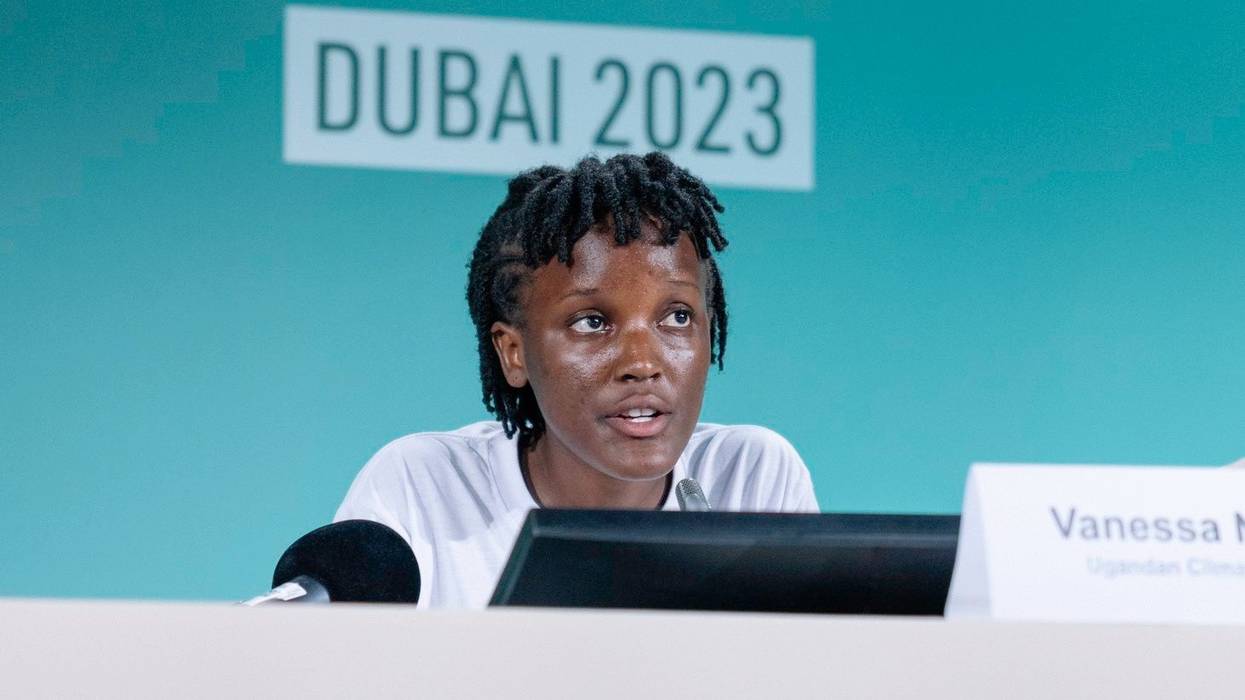Industry-Dominated COP28 'Unacceptable,' Says Vanessa Nakate
"As time runs out in Dubai, it feels as though the lifeboat of our shared humanity is sinking."
As negotiators worked on the final agreement at the United Nations Climate Change Conference, Ugandan campaigner Vanessa Nakate on Tuesday called out world leaders for continuing decades of inadequate action on planet-heating fossil fuels at COP28.
While the United Arab Emirates-hosted summit winds down, "I find myself thinking of a 6-year-old boy called Desmond I met in Turkana county, Kenya, who died from severe acute malnutrition on the same day," Nakate, also an author and United Nations Children's Fund (UNICEF) goodwill ambassador, wrote in a Guardian opinion piece.
"His death was the result of a climate-induced drought that has left millions of people on the brink of starvation in the Horn of Africa," she explained. "I want the negotiators deciding the outcome of COP28 to know Desmond's story. Because in the end, the climate crisis is not about pledges, statistics, reports, or activists. It's about human suffering and ruined lives. It's about death."
The draft COP28 deal released Monday fails to mention a fossil fuel phaseout that global scientists warn is necessary to prevent more climate chaos. According to Agence-France Presse, Nakate called the latest text a "death sentence for communities."
"It can be tiring to keep coming to these places and to be constantly disappointed by the decisions that are made," the campaigner said during a Tuesday press conference. "For this COP to be truly a success, it has to address fossil fuels."
"If leaders fail to address the root cause of the climate crisis after 28 years of climate conferences, then they aren't only failing us, but they're making us lose trust in the entire COP process," the 27-year-old said. "What is happening here is unacceptable. What is happening is unjust. What is happening is unfair."
"There are over 2,400 fossil fuel lobbyists that have a lot of control and power over this process," Nakate noted. "And we must call out that sabotage, we must call out the power. We must hold the fossil fuel companies accountable for the climate crisis."
In remarks to reporters and her Guardian piece, she stressed the stakes by describing the draft text as "sinking the lifeboat for humanity."
"As time runs out in Dubai, it feels as though the lifeboat of our shared humanity is sinking," she wrote for the newspaper. "And fossil fuels are also not the entire story here. The 'home' the majority of us will return to when COP28 is over is not the home we once felt safe in. Many of our homelands are already being decimated by extreme weather. Huge changes are already with us and even more are inevitable—even if countries had agreed to a fossil fuel phaseout. So we must adapt."
The Ugandan declared that "COP28 needs to be the COP that finally delivers a Global Goal on Adaptation—a map for the world's attempts at adaptation and clarity on how we will fund them. At an absolute minimum, developed countries need to double adaptation finance to $40 billion per year by 2025."
Noting the "selfish, short-sighted actors... once again sabotaging our collective fate in the name of profit," Nakate argued that "in the final hours of COP28, progressive states and activists need to fight with all we have for a phaseout of all fossil fuels, without distractions. We also need to see a real and tangible outcome on adaptation. They are connected. And neither can be sacrificed for the other."
"To those at COP28, I say this: People around the world are watching you—including people who have watched their children die as a direct result of your decades of inaction," she warned. "There is nowhere to hide."


